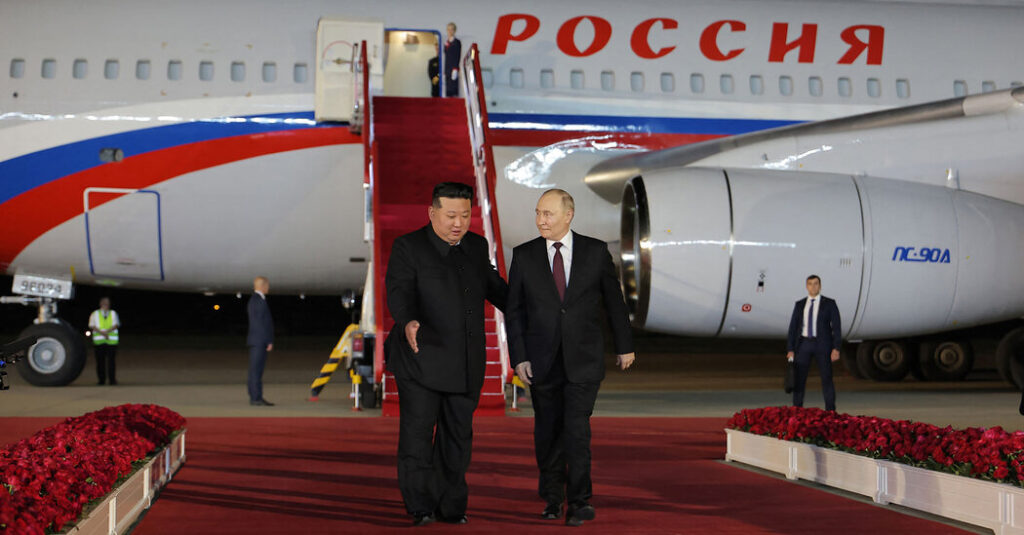Russian President Vladimir V. Putin visited North Korea for the first time in nearly a quarter century on Wednesday, meeting with the country’s supreme leader, Kim Jong Un. The two dictators vowed to forge a united front against the United States and to deepen bilateral ties that have Washington concerned about a growing arms trade.
Putin is the first major head of state to visit North Korea since the pandemic began, underscoring the importance of the country to Russia: It is one of the few like-minded countries capable and willing to supply Moscow with badly needed conventional weapons for the Ukraine war.
Kim gave Putin a red-carpet welcome in North Korea’s capital, Pyongyang, early on Wednesday, as Kim’s energy-hungry regime bathed downtown Pyongyang in bright lights and the two leaders rode to the state guesthouse in the same car — a Russian-made Aurus limousine that Putin gifted Kim last year.
Putin’s war in Ukraine has brought the two leaders closer than ever, and the two leaders were due to spend much of Wednesday in talks before Putin travels to Vietnam, according to Russian state media.
Putin has received artillery shells and missiles from North Korea to fuel a long war in Ukraine and is widely expected to seek more during his visit, while Kim is eager for Russia to help ease his country’s oil shortages, improve its weapons systems and undermine U.S. attempts to strangle the North Korean economy with international sanctions.
The Putin-Kim alliance has alarmed the United States and its allies, especially South Korea, because it threatens to undermine efforts to curb North Korea’s nuclear and missile programs. It also poses a threat to global efforts to non-proliferate nuclear weapons. Moscow once joined the United States in imposing UN sanctions on countries such as North Korea and Iran over their nuclear programs, but those days appear to be over.
“I don’t think he’d ever agree to that again,” Michael A. McFaul, a former U.S. ambassador to Russia and director of Stanford University’s Freeman Spogli School of International Studies, said of Putin. “I think he has decided that the United States is the enemy, that the liberal international order that the United States supports is over, and he wants to destroy it.”
Weeks before Putin’s visit, Russia used its veto in the U.N. Security Council to disband a U.N. committee of experts that helped implement sanctions aimed at making it harder for North Korea to develop a nuclear weapon.
On the eve of his arrival in North Korea, in a column published in the country’s main state-run newspaper, the Rodong Sinmun, Putin condemned the United States as a “global neo-colonialist dictatorship” and praised Kim Jong Un for resisting “U.S. economic pressure, provocations, intimidation and military threats.”
With North Korea’s economy devastated by sanctions, Kim is eager to capitalize on his cooperation with Putin. North Korea’s state-run Korean Central News Agency on Wednesday called the deepening ties between the two leaders “a driving force for accelerating the building of a new multipolar world.” The Workers’ Party chairman said the two countries were “in the same trenches” in the fight against Washington and its allies.
Putin’s visit to North Korea “demonstrates that our security is global, not regional,” NATO Secretary-General Jens Stoltenberg said in Washington on Tuesday. At a joint press conference With Secretary of State Antony J. Blinken.
“What happens in Europe matters to Asia, and what happens in Asia matters to us,” Stoltenberg said. “This is clearly demonstrated in Ukraine, where Iran, North Korea and China are supporting and fueling Russia’s war of aggression against Ukraine.”
Analysts were closely watching to see how much and what kind of military and economic support Kim might receive from Putin.
“He’s not going to give Putin everything he wants for free, and I worry that this could be the start of military assistance that could lead to the modernization of North Korea’s weapons systems, including nuclear launch vehicles,” McFaul said. “I’m afraid this could ruin everything. This is one area where Russia has real capability to bolster North Korea’s military-industrial complex.”
North Korea’s military has long been derided for its backward technology and vast stockpiles of outdated Soviet-era weaponry, such as artillery shells, but Putin’s first visit to Pyongyang since 2000 suggests that these outdated weapons are among those Russia most desperately needs in its war of attrition in Ukraine.

